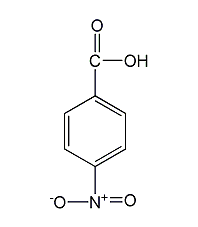p-Nitrobenzoic acid 4-Nitrobenzoic acid


Structural formula
| Business number | 01C6 |
|---|---|
| Molecular formula | C7H5NO4 |
| Molecular weight | 167 |
| label |
4-nitrobenzoic acid, Aromatic nitrogen-containing compounds and their derivatives |
Numbering system
CAS number:62-23-7
MDL number:MFCD00007352
EINECS number:200-526-2
RTECS number:DH5075000
BRN number:973593
PubChem number: 973593
Physical property data
1. Properties: White to light yellow monoclinic crystal
2. Density (g/mL, 20/4℃): 1.610
3. Relative vapor density (g/mL, air=1): Uncertain
4. Melting point (ºC): 239~241
5. Boiling point (ºC, normal pressure): Uncertain
p>
6. Boiling point (ºC, 5.2kPa): Uncertain
7. Refractive index: Uncertain
8. Flash point (ºC): 237
9. Specific rotation (º): Uncertain
10. Autoignition point or ignition temperature (ºC): Uncertain
11. Vapor pressure (kPa, 25ºC): Uncertain
12. Saturated vapor pressure (kPa, 60ºC): Uncertain
13. Heat of combustion (KJ/mol): Uncertain
14. Critical temperature (ºC): Uncertain
15. Critical pressure (KPa): Uncertain
16. Log value of oil-water (octanol/water) partition coefficient: Uncertain
17. Explosion upper limit (%, V/V): Uncertain
18. Explosion lower limit (%, V/V): Uncertain
19. Solubility: Soluble in ethanol, ether, chloroform, acetone, boiling water, slightly soluble in benzene and carbon disulfide, insoluble in petroleum ether. Water solubility <0.1 g/100 mL at 26 ºC
Toxicological data
It is toxic and irritating to the skin. The mouse LD50 of its sodium salt is 10 mg/kg.
Ecological data
None yet
Molecular structure data
1. Molar refractive index: 39.72
2. Molar volume (cm3/mol): 113.8
3. Isotonic specific volume (90.2K ): 324.8
4. Surface tension (dyne/cm): 66.4
5. Polarizability (10-24cm3): 15.74
Compute chemical data
1. Reference value for hydrophobic parameter calculation (XlogP): None
2. Number of hydrogen bond donors: 1
3. Number of hydrogen bond acceptors: 4
4. Number of rotatable chemical bonds: 1
5. Number of tautomers: none
6. Topological molecule polar surface area 83.1
7. Number of heavy atoms: 12
8. Surface charge: 0
9. Complexity: 190
10. Number of isotope atoms: 0
11.���Determine the number of atomic stereocenters: 0
12. Uncertain number of atomic stereocenters: 0
13. Determine the number of chemical bond stereocenters: 0
14. Number of uncertain chemical bond stereocenters: 0
15. Number of covalent bond units: 1
Properties and stability
Storage method
This product should be kept sealed, dry and protected from light. Production equipment must be sealed to prevent leakage. Operators should wear protective equipment.
Packaged in iron drums, fiberboard drums or sacks lined with plastic bags. Net weight per barrel (bag) is 20kg or 40kg. Store in a cool, ventilated, dry place, protected from heat and sun. Store and transport according to regulations on toxic chemicals.
Synthesis method
Obtained from the oxidation of p-nitrotoluene. The oxidizing agent can be sodium dichromate, air, manganese ore powder, nitric acid, etc. Using p-nitrotoluene as raw material, in the presence of sulfuric acid, oxidation reaction is carried out with sodium dichromate at 55°C to generate p-nitrobenzoic acid. The reaction solution is filtered, centrifuged and dehydrated, washed and dried to obtain the finished product. In addition, using the dextrorotatory product 1-p-nitrophenyl-2-amino-1,3-propanediol in the production of chloramphenicol, it is easy to oxidize it with nitric acid to obtain p-nitrobenzoic acid.

Purpose
This product is an intermediate for organic synthesis of medicines, dyes, veterinary drugs, photosensitive materials, etc. Used for the production of procaine hydrochloride, procaine amide hydrochloride, p-aminomethylbenzoic acid, folic acid, benzocaine, antitussive, cephalosporin V, p-aminobenzoylglutamic acid, benzoate Neil, and produces reactive brilliant red M-8B, reactive red violet X-2R, as well as filters, color film couplers, metal surface rust removers, sunscreens, etc.
